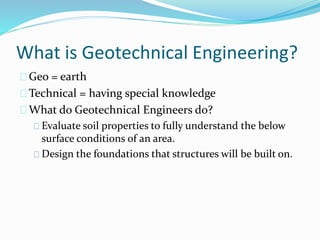The Best Guide To Geotheta
The Best Guide To Geotheta
Blog Article
The Only Guide to Geotheta
Table of Contents5 Easy Facts About Geotheta ExplainedExcitement About GeothetaGeotheta Can Be Fun For AnyoneAll About Geotheta
They work together with civil engineers, architectural engineers, designers, and other specialists to incorporate geotechnical factors to consider right into the overall job layout and building and construction procedure. This needs reliable team effort, control, and interaction to ensure that the geotechnical facets line up with the project goals and satisfy regulatory needs.Mining & Materials Engineering: Principles of exploration, penetration prices, and variables influencing the selection of exploration approach. Features of explosives, shooting systems and blast patterns. Blasting strategies in surface and underground workings. Special blowing up strategies at excavation borders. Resonance and sound control. Mechanical and continuous techniques to fragmentation, consisting of longwall shearing and fullface boring.
Modelling of fragment and fragment size distributions; comminution as a transfer feature. Comminution technology: crushing, grinding, size category. Integrated analysis of fragmentation and comminution procedures. Offered by: Mining & Products Engineering.
Fascination About Geotheta
Bachelor's degree programs in civil, geotechnical, geological, and ecological engineering commonly last 4 years and include basic education programs in English, social science, and the humanities, along with programs in sophisticated mathematics, structural geology, and liquid mineralogy. (https://packersmovers.activeboard.com/t67151553/how-to-connect-canon-mg3620-printer-to-computer/?ts=1722609175&direction=prev&page=last#lastPostAnchor)
Geotechnical engineering entails the evaluation of the dirt and rock conditions at a certain site, and their effects for the development of that site. As a lot of frameworks rely upon the ground for assistance, it is without surprise that a thorough understanding of the ground problems, and the suitability of foundation systems, are vital to the lasting stability and efficiency of the structure or structure.
Specialising in the examination of geological formations and ground practices, geotechnical designers perform scientific examinations and testing to recognize the influence these geological developments may carry the style and building of building, civil and infrastructure projects. This experience is essential for the style and building of structures, roads, passages, dams, bridges, and water system and sewer system.
The geotechnical team at Douglas Partners routinely seek advice from with designers, design designers, designers, and builders to make referrals on style and growth proposals to make certain that the built structures are accordingly designed for the ground problems. For example, the layout of footing systems needs to think about the weight of the framework, the capacity of the ground to sustain that weight with each other with movement resistances and reliable building.
How Geotheta can Save You Time, Stress, and Money.
This job is considerably streamlined by the use our Douglas Map geospatial platform that makes this details conveniently available in an easy to use web internet browser user interface. A geotechnical engineer will certainly direct the boring of boreholes and examination pits to gather soil and various other examples, and additionally analyze surface area attributes and ground exposures to develop a geotechnical version of the subsurface conditions.
Depending on the task kind and ground problems experienced, lab screening might to name a few points examine stamina, compressibility, sensitivity and/or leaks in the structure of soil and rock samples. After this data is collected and collected, the results are made use of for a geotechnical version of the site, which is usually provided as areas throughout the website.

A geotechnical examination by nature can only assess the ground problems at the places drilled or excavated. Natural variations in dirt and rock problems can occur throughout a site and in between examination places. It is as a result good method that the geotechnical designer be kept throughout building of the project to give on-site confirmation that the ground problems experienced follow the expectations and recommendations supplied in the geotechnical examination record.
About Geotheta
Geotechnical engineers use their in-depth understanding of soil and rock to evaluate risk and resolve problems on This Site varied framework projectsGeotechnical engineering is a specialist branch of civil engineering which looks at the practices of earth products and the application of dirt and rock technicians. Geo Tech Engineer. As a geotechnical designer, you will evaluate the physical, mechanical and chemical properties of soil and rock in order to make structures, keeping frameworks and earthworks
Geotechnical engineering is very closely linked to and overlaps with, both engineering geology and ground engineering - https://www.edocr.com/v/p4pabymp/ianhammond2191/geotheta. It's feasible to specialise in geotechnics or help a geotechnical company however be understood as an engineering rock hound or a ground engineer. As a geotechnical designer, you'll require to: develop and maintain relationships with clients and other professionals involved in the site, throughout each projectmaintain security criteria on website be mindful of expense ramifications when you make recommendationsstudy geological maps and aerial photographs from a variety of sources and from various time periodsexamine construction intends to see just how viable they are based on your understanding of the siteinvestigate risks or geological threats for the sitesearch for eco sensitive features, such as garbage dump start to establish accurate and interpretive ground modelsplan field investigationsdrill and evaluate examples of bedrock, dirt, groundwater and extra materials supervise various other specialists on sitesolve technological issues as they emerge, such as unforeseen structures at drill sitesmonitor conditions during and after construction to make certain frameworks are stable in the short and lengthy termadding information collected on site to your preliminary researchcreating geotechnical calculations, drawings, and two or three-dimensional computer models translating the datamaking suggestions concerning the suggested use the site

Report this page